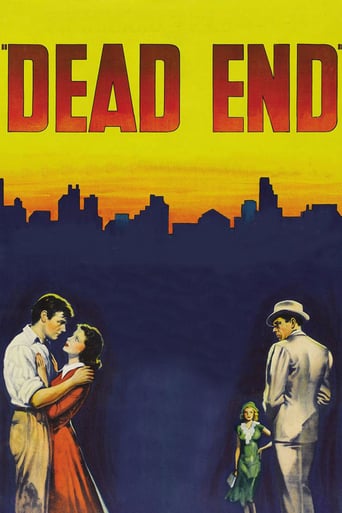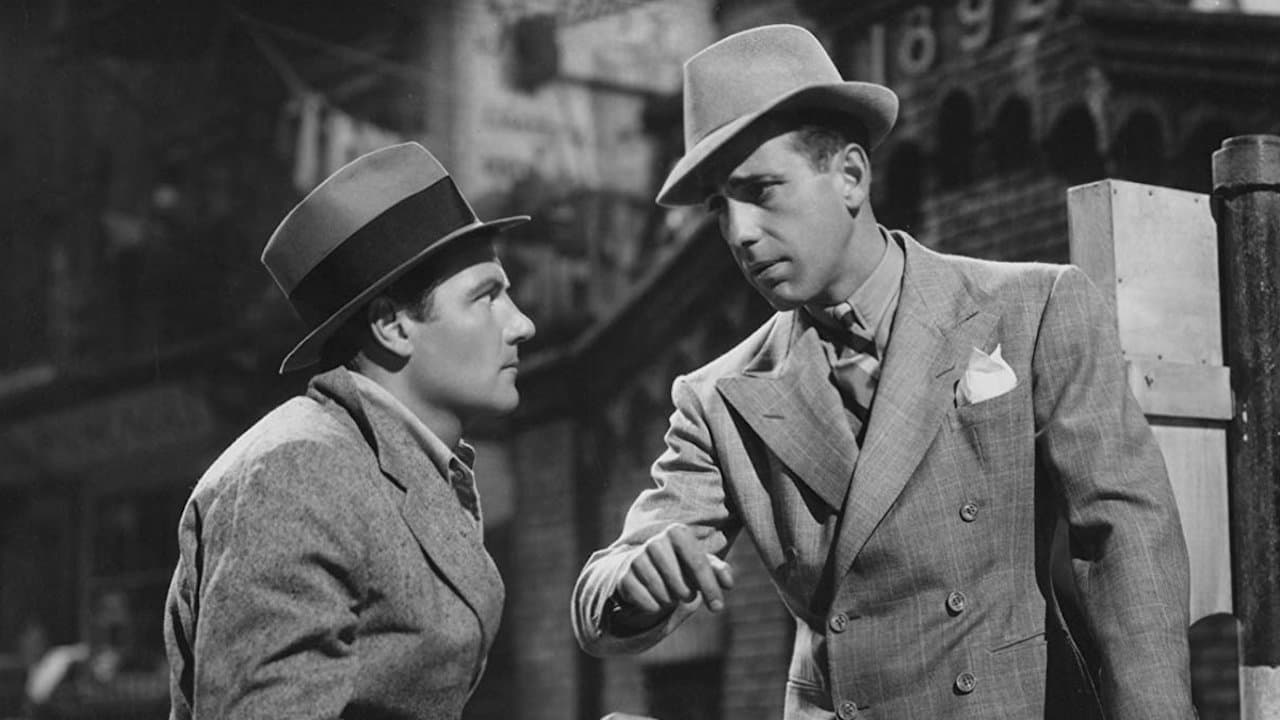chaswe-28402
A stagey, turgid mess contrasting slum-kid poverty with ill-defined high-rolling crime, though committed off-screen and merely suggested, and classy capitalist riches. Wait a year and watch The Adventures of Robin Hood and his 1938 redistribution of wealth instead. It is difficult to think of any creatures less appealing than those dead-end mini-gangsters. The impression left by this movie is its sense of unreality. The unvarying set scene is crammed with uninteresting incident, often repeated, which fails to advance the plot. Even the manner that McCrea gets chucked into the ditch, and then the misdirected shoot-out with Bogart towards the end both seem flimsy and fake. Bending over backwards to make allowances for the film's vintage, it still amazes me that it has attracted so many positive reviews and currently enjoys such a high rating.Its hour and a half is only redeemed by the presence, naturally, of Humphrey Bogart. Something of a mystery how this short, fairly homely- looking man succeeds in commanding such a strong screen presence. This may have its origins in the way he speaks. Firstly, no matter how rapidly the words leave his mouth, they are always clear and understandable. Secondly, they never sound like lines scripted by someone else: it's as if he had just thought of them himself, and instantaneously come up with them. Added to which is the realism of his facial expressions. But since he only has a supporting role, and gets eliminated by McCrea, he can't really help the story. He does glamorise the bad guy, which isn't what the film is trying to say. Most kids would rather be Bogart than McCrea. The romantic sub-plot adds nothing, and is of minimal interest.
gavin6942
The Dead End Kids, an unemployed architect, and gangster Baby Face Martin (Humphrey Bogart) interact with an East Side neighborhood over one day and night.Based on a play, this is a great cross-section of New York in the 1930s. We have gangster, street kids, and a man who tried to live legitimately. We have love and death. Perhaps most interesting, we open with the idea that the new houses on the East River overlook the slums. This is especially relevant in the 1930s when poverty was probably at it worst.Bogart is given a place of honor on the DVD cover. That is no surprise. But the real star is Joel McCrea, and on a personal note, I think it's a real shame that McCrea -- despite playing a fine leading man many, many times, seems to have been forgotten by the general public. Everyone knows Bogey, whether they watch his films or not... but not McCrea. Is it just because one is easier to parody?
feodoric
Sadly, I'm not as enthusiastic as other reviewers. I have seen much of Bogart's filmography, from The Petrified Forest to his last (The Harder They Fall), and my collection now includes nearly 30 of his movies. I watched this film with reasonable expectations, being aware that his part there is a support one. After all, Bogart was stealing the show even in his early years, when his contributions were merely secondary.Well I just watched Dead End for the first time yesterday and was left rather cold and even disappointed by it. As appropriately mentioned by others, it's really very (like in 'too much') theatrical, but not in a good way, at least for me. I was not familiar with these "Dead End Boys" and unlike others, I was far from impressed and was in fact irritated by their performance. It's one thing to deal with the overall atavistic overwrought style so typical of so many '30s movies, but it's another to try packing up as many pointless rough exchanges between young street brats as you materially can within an hour and a half. I mean, what is the point of keeping these absurdly annoying "misérables" relentlessly and dumbly insulting either each other or their opulent oppressors? As long as they're yapping their brains out and erase any silence or moment for reflection that might subsist in that blatantly dated movie play (a deliberate choice of words on my part...). Reading about how these young actors, who had been sent over to Hollywood to transpose their NY theatrical act to cinema, caused absolute chaos and sheer havoc offstage, I am almost tempted to think that Wyler, an otherwise very competent and often brilliant director, dealt with this wild bunch as best as he could, but likely experienced serious difficulties while piloting the making of this movie, with mixed results, to say the least. After Dodsworth the year before, what a turnoff! In his career, Wyler succeeded a lot in entertaining his viewers, and I was hoping that this one would be no exception. However...I am able to cope with most typical '30s movies along with their exaggerated declamatory style and machine-gun stance delivery. That's not the point.... I'm afraid that the Dead End play has failed to be adapted to cinema and is in fact a rather grating Frankensteinian creature with too many theatrical parts and functions to be palatable in the cinematographic language. The movie tries too hard to deliver social messages while attempting to narrate a potentially enlivening story and to present characters to whom we should somehow relate, but who end up leaving us indifferent at best (e.g. most of the main adult characters, including Bogart) or worse, extremely annoyed as with many of the Dead End bunch, I'm afraid to say.As for the major characters, there isn't enough space and time left for them to grow on the viewer and to become well-formed entities. I have seldom watched a Bogart as wooden as in this movie, and this has nothing to do with this being a support contribution. Bogart almost always stole the show before he started playing lead parts. No. As I see Dead End, it was in the end a showcase for the Dead End Brats and a list of their socio-political statements, a sort of 90-min allegory of the abysmal gap between rich and poor. Anything but a well-designed movie. There have been countless films dealing with this subject matter, and I'm afraid that Dead End is .... well, quite aptly named, after all. In more ways than one.
Steffi_P
Cinema has always had an uneasy relationship with the theatre. By their nature stage plays tend to have very long scenes and base everything around dialogue, and there is something in the power of having real life players there in front of you that makes this workable. But there is also something about the very specific visual form of cinema that makes straight adaptations of stage plays potentially very boring.The way in which this can be overcome, other than completely restructuring the source text, is by ensuring that the picture keeps moving and keeps storytelling on a visual level. You see, perhaps the most important difference between stage and screen, is that in the theatre every audience member sees things from a slightly different angle or distance – there is no universal perspective, and theatre directors have to ensure that everything is clear whichever seat it's seen from. But in the pictures everyone sees the exact same image at any given moment, and a screen director must find the best camera placements and shot arrangements. Fortunately for Dead End, this screen director William Wyler was among the best and most inventive users of space on screen. For starters, look at how the shots of the rich folks contrast with those of the poor ones. In the former, the camera mostly keeps an aloof distance, and everything is picked out in crisp white. In the latter, the camera is closer to the action, and the image is filled with mottled shades of grey.The other very important thing in adapting stage plays to screen, is to ensure the performances are presented as well as possible, in order to give cinema audiences a taste of that same atmosphere and presence they would feel in front of a stage. Wyler also happens to be especially good at this. In particular he is bold enough to focus us on just one facet of a performance, sometimes keeping a character with their back to the camera and not showing us their face, forcing us to focus more on their posture, or the reaction of the opposite person. He also keeps the entrances of characters in keeping with their nature – for example having Humphrey Bogart smoothly slide into the frame, or craftily appear in the background as other figures move aside.And the performances pay off big time. This was still a period in which an actor like Bogart was unlikely to be anything but a villain, but his appearance here surely raised his profile considerably and put him one step closer to those heroic leads. He adds some incredibly subtle yet effective touches – for example, when Joel McCrea gives him the cigarette, look at how he pauses before grudgingly lowering his head to accept the lighted match, as if this tiny stretch is some extreme display of generosity on Bogart's part. Joel McCrea is one of those actors (like, say, Gary Cooper or Van Heflin) who doesn't look like he ought to be a good actor – he looks like he ought to be an absolute hunk of wood – but he isn't. This is probably his finest performance. It's also the best I have seen from Sylvia Sidney. And of course there are those kids, every one of them a character.The strange thing to consider about the acting in Dead End, is that all the performances are essentially one-dimensional – but in the best possible sense. Bogart is continually a mean and moody presence, moving and speaking slowly, submerging his feelings under a veneer of hard-hearted masculinity. In so doing he fulfils his character's placement as the symbolic archetypal gangster figure. Sylvia Sidney is the eternal independent working class lass, while McCrea is the honest, level-headed working man, and even when he turns to violence it seems not so much character development but merely the natural result of his principled persona in extreme circumstances. Claire Trevor, in her portrayal of the prostitute-moll, has the very opposite tone to the measured performances of Bogart and McCrea, all venom and fragile emotion. Of such things many a Best Supporting Actress nomination is made.The odds were perhaps stacked in the filmmakers' favour with Dead End, it being a very engaging and punchy play that lends itself well to the cinematic medium. Of particular appeal is the way it begins as a kind of plot-less social study, but gradually a story emerges as the character's lives become interwoven. Still, it is the superb efforts of Wyler and his cast that really bring this one to life.



 AD
AD

